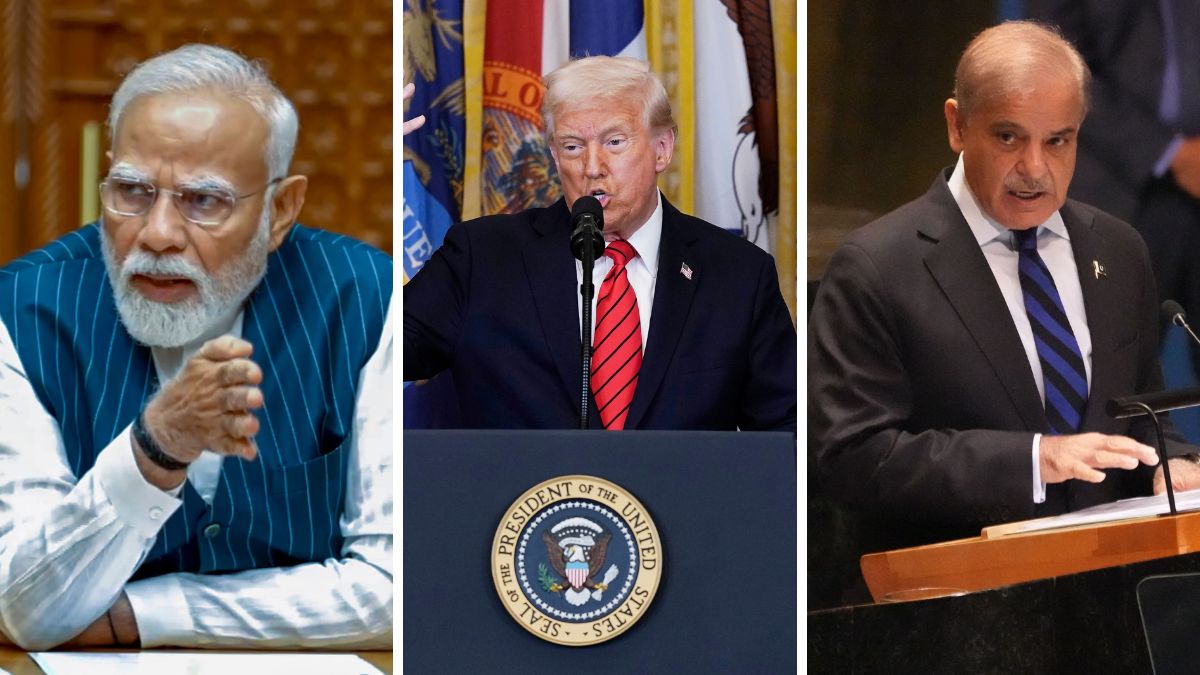Unlike Pakistan, India didn't lavish praise on the US for its mediation. Here is why
 Prime Minister Narendra Modi, US President Donald Trump and Pakistan Prime Minister Shehbaz Sharif | AP
Prime Minister Narendra Modi, US President Donald Trump and Pakistan Prime Minister Shehbaz Sharif | AP
Immediately after US President Donald Trump announced on social media that India and Pakistan had agreed to a full and immediate ceasefire, Islamabad confirmed the news, with Prime Minister Shehbaz Sharif praising Trump for his "leadership and proactive role" in helping Pakistan and India achieve peace.
Other leaders, including Deputy Prime Minister Ishaq Dar and PPP Chairman Bilawal Bhutto Zardari followed suit, heaping praise on the US for its intervention.
Indian confirmation came soon after, but interestingly, the Ministry of External Affairs stated that the agreement was worked out directly between the two sides. “It was agreed between them that both sides would stop all firing and military action on land and in the air and sea with effect from 1700 hours Indian Standard Time. Instructions have been given on both sides to give effect to this understanding," Foreign Secretary Vikram Misri's statement read.
The statement, ironically, downplayed the US involvement and made no mention of the US mediation. EAM S Jaishankar's statement, too, made no mention of the US and simply stated that "Pakistan and India have agreed to an agreement to stop firing and military action."
While Pakistani officials lavished praise on the US, the Indian side was not keen to highlight Secretary of State Marco Rubio's and Trump's mediation efforts. This, analysts think, reflects India's resistance to international mediation. Pakistan, on the other hand, thrives on foreign support as an ailing and struggling economy.
"India has never accepted mediation in any dispute, be it India-Pakistan or India-China, or any other," Dr. Aparna Pande, research fellow for India and South Asia, at the Hudson Institute, a think tank in Washington, DC, told CNN. Pande added that Pakistan has always sought international mediation. "So they will praise it. It is the only way it can put pressure on India to discuss and resolve the Kashmir dispute," she added.
India wasn't initially very enthusiastic about the US response, according to The New York Times. US Vice President JD Vance rang up Prime Minister Narendra Modi, urging him to consider alternatives to continued strikes, including a potential off-ramp that U.S. officials thought would prove acceptable to the Pakistanis. Though Modi listened, he did not commit to any of the ideas.
Rubio called Jaishankar after he rang up Pakistan’s foreign minister Ishaq Dar. However, it is not clear how persuasive he was, at least initially, the New York Times said.
Social media in India too did not take kindly to Trump's intervension. One user wrote: "The ceasefire is a good decision, but there was no need to involve the US as a mediator". However, Pakistan's population was only excited to hail Trump. "Chaudhry of the world, Trump has called a Pak-India Panchayat, now peace will be achieved," one user wrote.
India